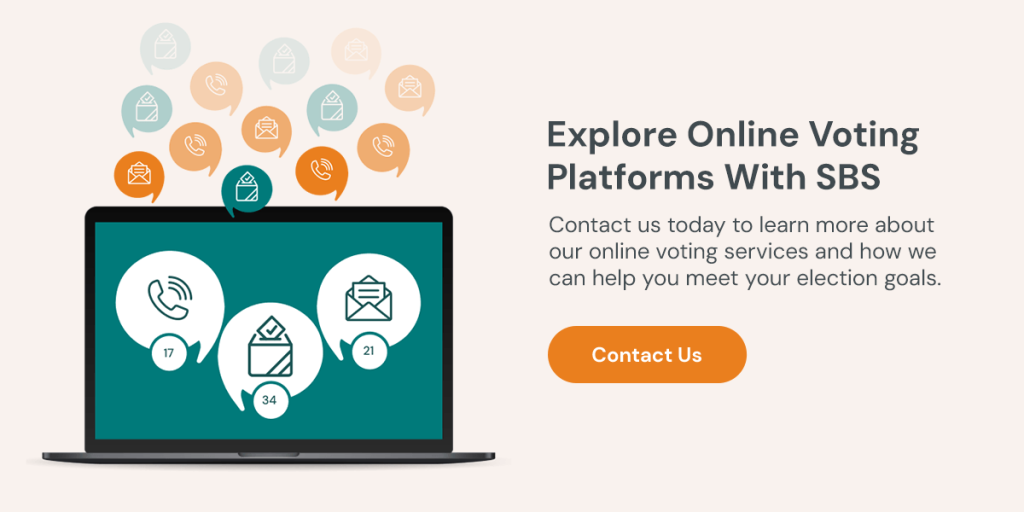Educating Policyholders on the Importance of Voting in a Mutual Insurance Company
As a mutual insurance company, you aren’t beholden to the demands of shareholders or stocks but to your policyholders. This shared ownership model aligns your customers’ expectations with corporate governance, provided the democratic process goes smoothly.
Voting is integral to running a productive, policyholder-friendly mutual insurance company, but what if policyholders aren’t engaged? Low engagement is a common problem for many mutual insurance companies, but even then, it’s critical to engage policyholders to steer your company toward a brighter future.
In this guide, we’ll explain what policyholders’ rights are and how mutual insurance companies can reengage them to boost participation in proxy voting.
What Is a Mutual Insurance Policyholder?
Mutual insurance policyholders are customer-owners who invest in the collective that is a mutual insurance company. Unlike traditional insurance companies, where investors or shareholders are the primary stakeholders, policyholders themselves own a share of a mutual insurance company. This unique setup not only shapes the company’s culture but also the role of policyholders.
As part-owners of your company, one of the roles of a policyholder is to vote on important matters such as:
- Board member elections
- Bylaw amendments
- Charter amendments (in some states)
Essentially, policyholders have a dual role—as customers who benefit from the services and owners with a say in the company’s operations and governance.
Do Mutual Insurance Policyholders Vote?
Yes. Voting is one of the most important roles of a policyholder in a mutual insurance company. The exact mechanism of how and when policyholders vote, as well as what they vote on, depends on state regulations and a company’s corporate structure. A policyholder’s vote is crucial to corporate governance, giving policyholders a direct say in decision-making.
Democracy is the heart of any mutual insurance company. Every policyholder vote helps you get a step closer to your policyholders’ needs, giving them a voice to steer the company’s permanent direction.
The sentiment of this business model is noble, but democratic participation is a big challenge for mutual insurance companies. It’s no wonder why, according to the National Association of Mutual Insurance Companies, 20% of mutual insurance companies solicit proxies for each annual or special policyholders meeting. Proxies help the company achieve a quorum but are not always ideal. The gold standard is true policyholder engagement, which gives you a precise view of policyholder expectations.
Engaging Policyholders in the Voting Process
Maintaining long-term engagement in the policyholder voting process is essential for a mutual insurance company. It ensures that decisions reflect the collective interests of policyholders, fostering a healthy and responsive company environment. Continuous engagement also helps build a strong sense of community and mutual responsibility among policyholders.
You know voting is important, but rousing policyholders from disengagement isn’t easy. Follow these six expert tips to build a thriving policyholder community that’s eager to vote.
1. Overcommunicate
Communication is the number-one barrier to policyholder voting. Many don’t know that they should vote or why it’s so important. Even fewer know how and when to actually vote.
If you haven’t already, work with your membership engagement or marketing team to overhaul communication efforts. The more educated policyholders are about their rights, the more likely they are to engage with the democratic process. This alone won’t solve the issue of disinterested policyholders, but it’s an essential first step.
Create an end-to-end engagement campaign that includes:
- Sales initiatives for prospective members that lean heavily into the voting aspect of a mutual insurance company
- Email campaigns to existing members and policyholders with participation reminders about why it’s important to vote and how to vote
- Simple graphics or videos explaining the voting process
- Engaging social media campaigns where policyholders post and share their voting experiences, ideally in interactive formats like short-form videos
- Quantitative metrics about the importance of voting in a mutual insurance company, especially when it comes to cost savings
- Q&A sessions with board members or executives where policyholders can ask questions and get direct responses
Keep your language as simple as possible in these campaigns. The less complex you frame the policyholder proxy voting process, the more likely policyholders will see it as beneficial.
2. Make Voting Easier and More Accessible
So many mutual insurance companies mistakenly complicate the voting process. For example, only 8% of companies accept proxy voting requests online, while 25% demand policyholders submit requests via fax. Others require policyholders to submit requests in writing before the policyholder meeting to raise any issues.
Whether you’re hanging onto outdated ideas of the election process or overly rigid compliance standards, these approaches create more barriers to proper governance. Instead of trying to manage everything yourself, go with an experienced election management solution like Survey & Ballot Systems (SBS).
SBS digitizes and streamlines the entire voting process for mutual insurance companies. Our tried-and-true system ensures complete accuracy with proxy voting via phone, web, paper, or any combination of methods. With SBS, you can finally set up the secure online voting option that we know your members have been asking you for.
Offer Online Proxy Voting With Survey & Ballot Systems
3. Incentivize Participation
Voting is a key role of a policyholder, but they might not realize how much they’re missing out on by not voting in your elections. Instead of taking a punitive approach, offer participation awards instead. Offer incentives for voting, such as entry into a draw for prizes, discounts on premiums, charitable donations, or other benefits. These incentives can motivate policyholders to take part in the voting process.
However, policyholders should be made aware of these incentives. Offering freebies to participants doesn’t do much good if nobody knows about them. Mention these incentives as part of your marketing campaign so policyholders know what they could get in exchange for participation.
4. Set up Multichannel Reminders
Email reminders are a great way to engage with more policyholders, but not everyone checks their email regularly. You’ll connect with more policyholders if you chat with them across platforms. Remind them about voting via text message, social media, and even direct mail to engage with anyone who might have slipped through the cracks otherwise.
5. Keep Policyholders in the Loop
Don’t just collect votes and disappear until it’s time for next year’s vote. Engage with policyholders after a vote to thank them for their participation and keep them informed about what changes, if any, this vote yielded. Keeping policyholders informed about company developments, board decisions, and how their votes have influenced past outcomes can motivate them to participate in future elections.
Transparency fosters trust and a sense of involvement. Share voting results online or via email to all policyholders, not just those participating. A fun graphic on voting participation data and new or exciting changes is also a great way to foster engagement.
6. Collect Feedback
Mutual insurance companies run on policyholder votes and feedback. Implementing a new voting system has a learning curve, so don’t hesitate to ask policyholders for their input. Inviting feedback on the voting process and acting on it demonstrates respect for policyholder opinions. Including policyholders in discussions about improving the voting process can also increase engagement.
Policyholder participation is both a privilege and the cornerstone of a successful mutual insurance company. This business model reflects the collective interests of the people you serve, but only if they actively participate in the democratic process. Every vote matters, so redouble your efforts to break through to policyholders and encourage them to exercise their right to vote.
Marketing campaigns alone will do a lot of the heavy lifting for you, but it’s much harder to encourage participation if you have a cumbersome, complex voting process. Partner with Survey & Ballot Systems to set up a secure, trustworthy voting framework that supports policyholder engagement. Contact Survey & Ballot Systems now to reconnect with voters, save time, and support the democratic process.



